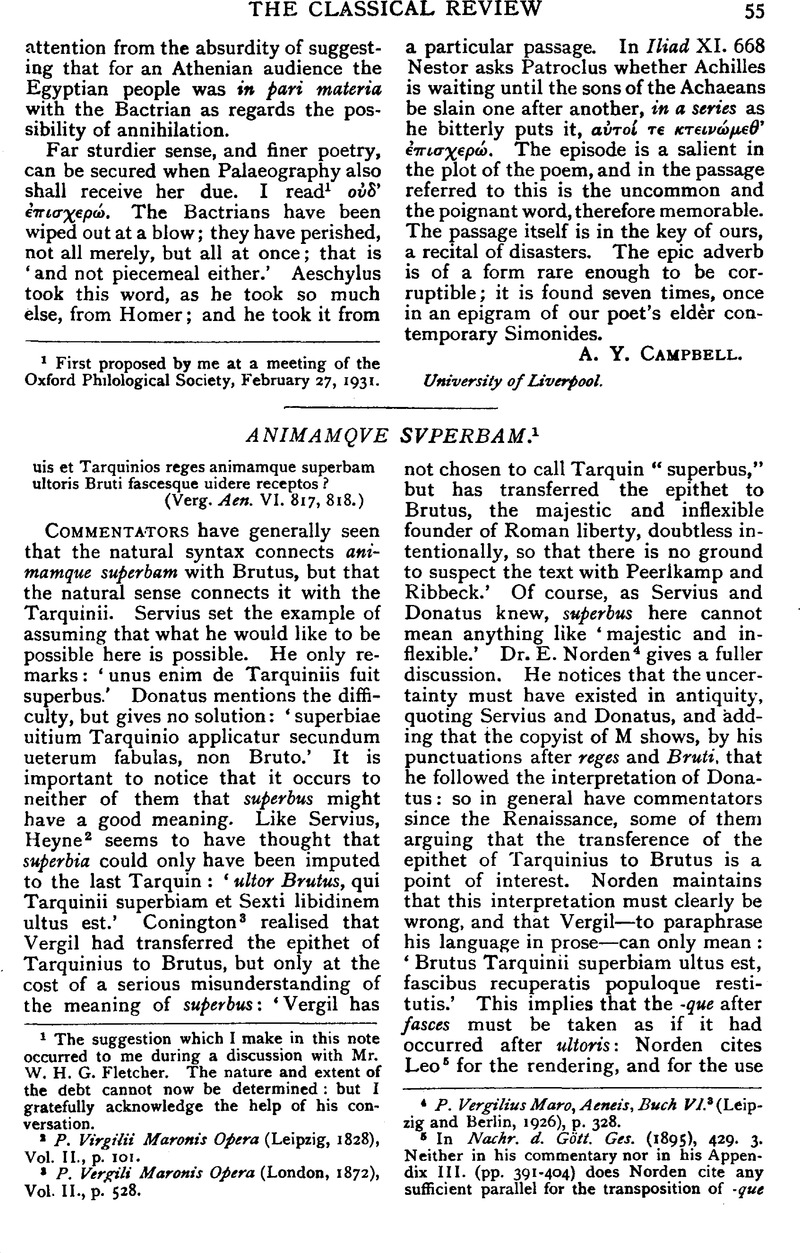No CrossRef data available.
Published online by Cambridge University Press: 27 October 2009

page 55 note 2 P. Virgilii Maronis Opera (Leipzig, 1828), Vol. II., p. 101.Google Scholar
page 55 note 3 P. Vergili Maronis Opera (London, 1872), Vol. II., p. 528.Google Scholar
page 55 note 4 P. Vergilius Maro, Aeneis, Buch VI.3 (Leipzig and Berlin, 1926), p. 328.Google Scholar
page 55 note 5 In Nachr. d. Gött. Ges. (1895), 429. 3.Google Scholar Neither in his commentary nor in his Appendix III. (pp. 391–404) does Norden cite any sufficient parallel for the transposition of -que which he has to suppose. I believe that most scholars continue to think that it would be unique. Transpositions to the beginning of the second half of a pentameter are clearly irrelevant.
page 56 note 1 Norden, p. 98.
page 56 note 2 Ibid., p. 99.
page 56 note 3 The Sixth Book of the Aeneid (Oxford, 1920), p. 251.Google Scholar Professor Butler thinks that the transposition of -que would not be quite unparalleled, but he does not cite other instances.
page 56 note 4 L'Oltretomba nell' Eneide di Virgilio (Palermo and Rome, 1924), pp. 155, 156, and p. 156, note 1.Google Scholar
page 56 note 5 Publicola VI.
page 56 note 6 The Allegory of the Aeneid (Oxford, 1927), passim.Google Scholar
page 56 note 7 Professor, Conway, R. S. [Martin Classical Lectures, I. (1930: Harvard University Press, 1931), pp. 178–179] contends that Vergil and Horace influenced Augustus towards clemency.Google Scholar
page 57 note 1 Dio Cass. XLIII. 24. 3–4.
page 57 note 2 Suet. August. XV.: Dio Cass. XLVIII. 14. 3–4: Seneca, De clement. I. xi. 1. Seneca says that Augustus hated the memory of his youthful atrocities, and was a very different man in after years.
page 57 note 3 Aen. X. 517–520.
page 57 note 4 Vergil's Primitive Italy (New York, 1931), pp. 97–120.Google Scholar
page 57 note 5 In Classical Journal XXVII. (1931–1932, pp. 39–41.Google Scholar
page 57 note 6 To Vergil, as Professor J. L. Myres kindly reminds me, superbus must have closely recalled the Homeric ὑπρβιος, ὑπερφαλος, in the sense apparent e.g. in Iliad III. 105–110. The quality is directly opposite to the Augustan πιεκεια. If Vergil wished to ‘legitimise the monarchy of Augustus,’ as in some sense he certainly did [a view mentioned without explicit endorsement by Funaioli (p. 155), who cites for it (p. 155, note 2) Goumy, E., Les Latins (Paris, 1892), p. 203]Google Scholar, he must necessarily deprecate the faults both of the old regal monarchy and of republicanism. This twofold deprecation is sufficiently apparent, pace Funaioli, in Aen. VI. 817, 818.
I think that my insistence on the necessity of a derogatory meaning for superbus is sound, above all in this context. The instances, given by Lewis and Short, in which the post-Augustan meanings seem to appear already in Augustan poetry, are mainly metaphorical and quite indecisive. Among them is Verg. Aen. I. 21: hinc populum late regent belloque superbum …, which at first sight suggests a meaning ‘proud,’ for the nation is the Roman nation. But the thought is Juno's; and here too rex and superbus are associated. To Juno, Roman rule may well have seemed a tyrannical despotism.